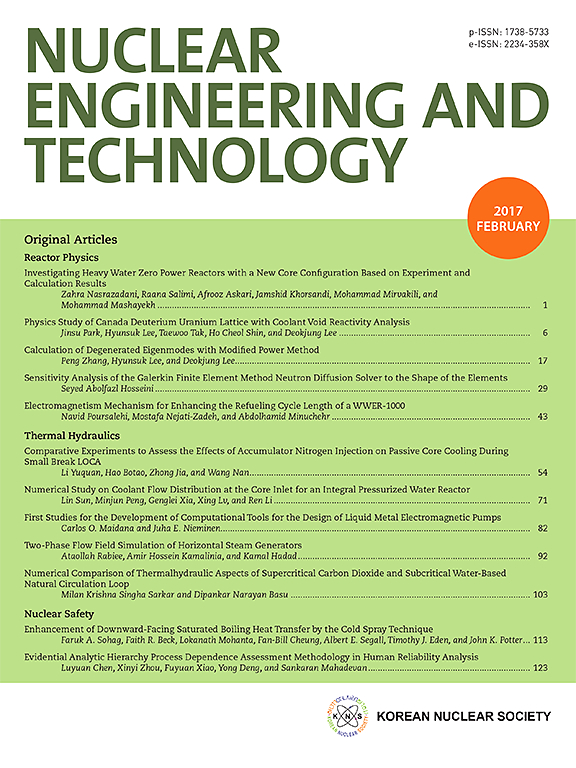Searching for an optimal fuel for a supercritical water reactor (SCWR) to dispose of minor actinides resulting from the nuclear waste
IF 2.6
3区 工程技术
Q1 NUCLEAR SCIENCE & TECHNOLOGY
引用次数: 0
Abstract
This work investigates the optimal treatment of Minor Actinides (MAs) produced in the spent fuel of nuclear reactors operating around the world. This process is very important in addressing the challenges associated with nuclear waste and reducing environmental impact. A three-dimensional model of a supercritical water reactor (SCWR) has been designed using MCNPX to make a comprehensive neutronic analysis. MAs with a concentration of 1 % have been added to UO2, (Th, U)O2, (Th, 233U)O2 and (Th, rgPu)O2. These fuels have been uploaded in the SCWR assembly and burned in a separate fuel cycle. The infinity multiplication factor (kinf) of the suggested has been investigated with and without adding the minor actinides to analyze the effect of MAs on the reactor reactivity. The fuel constituents, plutonium concentration, MAs concentration and transmutation rate have been tracked with fuel burnup. The reactivity temperature coefficients have been calculated for the suggested cases to ensure the validity of the suggested fuels. The power peaking factor (PPF) and radial power distribution have been calculated for the suggested fuels. The neutronic analysis confirms the suitability of the suggested fuel in burning a significant amount of MAs.
为超临界水反应堆(SCWR)寻找最佳燃料,以处理核废料产生的小锕系元素
这项工作研究的是如何优化处理世界各地运行的核反应堆乏燃料中产生的小锕系元素(MAs)。这一过程对于应对与核废料相关的挑战和减少对环境的影响非常重要。利用 MCNPX 设计了一个超临界水反应堆(SCWR)的三维模型,以进行全面的中子分析。在 UO、(Th, U)O、(Th, U)O 和 (Th, rgPu)O 中添加了浓度为 1 % 的 MA。这些燃料已装入重水反应堆组件,并在单独的燃料循环中燃烧。在加入和不加入次锕系元素的情况下,对所建议的无限倍增因子(k)进行了研究,以分析次锕系元素对反应堆反应性的影响。燃料成分、钚浓度、MAs 浓度和嬗变率随燃料燃烧而变化。计算了建议情况下的反应温度系数,以确保建议燃料的有效性。还计算了建议燃料的功率峰值系数(PPF)和径向功率分布。中子分析证实,建议的燃料适合燃烧大量的 MA。
本文章由计算机程序翻译,如有差异,请以英文原文为准。
求助全文
约1分钟内获得全文
求助全文
来源期刊

Nuclear Engineering and Technology
工程技术-核科学技术
CiteScore
4.80
自引率
7.40%
发文量
431
审稿时长
3.5 months
期刊介绍:
Nuclear Engineering and Technology (NET), an international journal of the Korean Nuclear Society (KNS), publishes peer-reviewed papers on original research, ideas and developments in all areas of the field of nuclear science and technology. NET bimonthly publishes original articles, reviews, and technical notes. The journal is listed in the Science Citation Index Expanded (SCIE) of Thomson Reuters.
NET covers all fields for peaceful utilization of nuclear energy and radiation as follows:
1) Reactor Physics
2) Thermal Hydraulics
3) Nuclear Safety
4) Nuclear I&C
5) Nuclear Physics, Fusion, and Laser Technology
6) Nuclear Fuel Cycle and Radioactive Waste Management
7) Nuclear Fuel and Reactor Materials
8) Radiation Application
9) Radiation Protection
10) Nuclear Structural Analysis and Plant Management & Maintenance
11) Nuclear Policy, Economics, and Human Resource Development
 求助内容:
求助内容: 应助结果提醒方式:
应助结果提醒方式:


